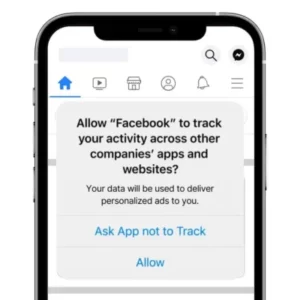Privacy. It’s not just some buzzword. It is a core concept that is now part of the fabric of marketing—something any marketer must consider and incorporate into their strategy.
Consumers have spoken, and it is overwhelmingly in the favor of privacy. Now even the biggest corporations are learning to embrace the desire of their users and are therefore providing new and powerful ways for consumers to protect their data.
So how have these efforts impacted us already? How will they continue to evolve? What should marketers do to adapt in this new digital landscape?
Let’s dive into this privacy trend and see how it impacts the future of marketing.
iOS 14 changed the way we work
 It’s no longer a mystery. We know the impact iOS 14 has had. In September of 2020, Apple released their new mobile operating system, providing users the ability to opt out of sharing their data with any app on their phone. Since then, we’ve seen what this has done to the tracking, targeting, and personalization of ads.
It’s no longer a mystery. We know the impact iOS 14 has had. In September of 2020, Apple released their new mobile operating system, providing users the ability to opt out of sharing their data with any app on their phone. Since then, we’ve seen what this has done to the tracking, targeting, and personalization of ads.
What’s clear is that most people will not opt in to data sharing. In fact, after the iOS 14 release the daily opt-in rate for US users was only 6%! That means 94% of people opted to prevent all the usual tracking within apps from working (including Facebook). Even though not all users are iPhone users, marketers have had to change their strategies.
This loss of data causes issues across a multitude of marketing areas. For instance, tracking the customer journey becomes more difficult. Since the Identifier for Advertisers (IDFA) is not coming through, each touchpoint for a customer can not be linked together. It’s difficult to see what steps a customer took on the way to a conversion, and many have had to default back to last-touch attribution, giving all the credit to the last touchpoint before conversion, as they can’t tell what other steps that customer may have gone through.
Users not sharing their IDFA are often excluded from detailed targeting and retargeting, as their data specifics and demographics are unavailable. Without being able to target specifically, the highly-customized ads of the past are often not even possible after this loss of data from iOS 14. However, this is not the end-all of privacy. This is only the beginning.
Future hurdles and approaches to privacy-first marketing
Historically, Android has lagged behind Apple in terms of privacy. But even Google has said that they intend to increase privacy options for their users moving forward. When these updates eventually release and all mobile customers have an option to opt out of sharing data, we will truly enter a whole new world of advertising.
Mobile advertising is a bedrock of modern marketing efforts and losing all this data on all mobile devices will have a massive impact. Entire attribution models will be rendered invalid. Targeting and personalization efforts will often be futile.
To overcome these attribution woes, smart apartment marketers should start planning now. While proposed solutions may be in their infancy stage now, apartment marketers need to find new approaches and methods to continue to optimize campaigns, even without optimal data.
Some may take the easy route and push to last-touch attribution, giving up on personalized, targeted ad experiences. They’ll default back to fewer, more generalized ads and call it a day.
Truly savvy marketers, however, will look for ways to maintain their efforts. They will find ways of creating first-party data (data shared directly by customers via web visits, email signups, form fills, etc.) and then leverage that data to optimize advertising in ways no other marketers can.
Furthermore, smart marketers will seek to build relationships with renters with honesty and transparency. With clear and accessible data policies, cookie opt-outs, and upheld promises to protect their data, property management companies can earn critical trust from renters to improve marketing and leasing outcomes.
In addition to collecting your own first party data, apartment marketers should explore partnerships that give them access to additional renter data. Partnering with vendors that offer such data will be key to running optimized, effective campaigns in the future. For instance, Rent. generates first-party audience data from our network of apartment finding sites, which, in turn, powers search and social advertising products to produce higher than industry average click-through-rates and lower cost-per-click.
Privacy isn’t going away. It’s now an essential part of the future of marketing and advertising. Sure, iOS 14 changed the way we work. Of course, privacy standards will only continue to increase. There will be countless future hurdles, but as privacy evolves, approaches to overcome those hurdles will too. Marketers are built to think on their feet and find creative solutions. Those who develop or source robust first-party data in consumer-trusted ways will be well-poised to thrive in the new privacy-first digital landscape.










